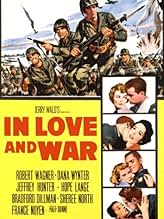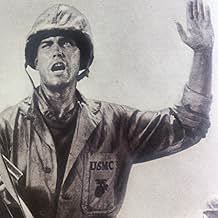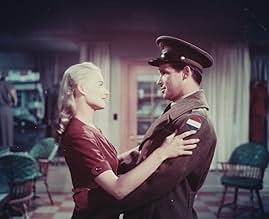Ajouter une intrigue dans votre langueIn 1944, the family lives of three San Francisco Marines are affected by their personal experiences on the front lines in the Pacific and at home.In 1944, the family lives of three San Francisco Marines are affected by their personal experiences on the front lines in the Pacific and at home.In 1944, the family lives of three San Francisco Marines are affected by their personal experiences on the front lines in the Pacific and at home.
- Prix
- 1 victoire au total
Edit Angold
- Maid
- (uncredited)
Edith Barrett
- Mrs. Lenaine
- (uncredited)
James Bell
- Sidney Lenaine
- (uncredited)
Barry Bernard
- Hotel Clerk
- (uncredited)
Barry Brown
- Minor Role
- (uncredited)
Avis en vedette
The story follows three marines, and their girls, from home leave to combat in the Pacific.
The movie's very much a mixed package. With a couple exceptions, war films of the 1950's shied away from combat realism, whose trauma might easily overwhelm audiences. The second half of this war film does a pretty good job portraying the so-called fog of war, along with perfectly natural emotional and physical reactions to combat death. These scenes are done on exterior sets and are uglified to maximal extent. Such grim scenes are then intercut with sunny scenes in San Francisco, done in glowing candy box colors. The resulting contrast is appropriately jolting, to say the least, and leaves no doubt that between "love" and "war", which is to be preferred.
The trouble lies with a swollen narrative that is too conventional in the "Love" part. It also shows what happens when a big studio, TCF, decides to promote a younger cast into possible stardom. Everybody—about the top seven in the cast list—gets cameo screen time, in the film's first half, especially. This draws out the runtime, and coupled with a conventional script, tends to drag out the first part, long after we've gotten the idea. The actors perform well enough, though O'Neill's (Wagner) drunken binge is over the top, maybe the only time in the actor's generally restrained career. Note, in passing, the post-war symbolism of pairing Newcombe (Dillman) with Kalai (Nuyen).
All in all, the movie's a good look at how Hollywood shaped WWII to commercial needs of the big screen. But is otherwise forgettable.
The movie's very much a mixed package. With a couple exceptions, war films of the 1950's shied away from combat realism, whose trauma might easily overwhelm audiences. The second half of this war film does a pretty good job portraying the so-called fog of war, along with perfectly natural emotional and physical reactions to combat death. These scenes are done on exterior sets and are uglified to maximal extent. Such grim scenes are then intercut with sunny scenes in San Francisco, done in glowing candy box colors. The resulting contrast is appropriately jolting, to say the least, and leaves no doubt that between "love" and "war", which is to be preferred.
The trouble lies with a swollen narrative that is too conventional in the "Love" part. It also shows what happens when a big studio, TCF, decides to promote a younger cast into possible stardom. Everybody—about the top seven in the cast list—gets cameo screen time, in the film's first half, especially. This draws out the runtime, and coupled with a conventional script, tends to drag out the first part, long after we've gotten the idea. The actors perform well enough, though O'Neill's (Wagner) drunken binge is over the top, maybe the only time in the actor's generally restrained career. Note, in passing, the post-war symbolism of pairing Newcombe (Dillman) with Kalai (Nuyen).
All in all, the movie's a good look at how Hollywood shaped WWII to commercial needs of the big screen. But is otherwise forgettable.
About half of the film is all about relationships between three marines and their sweethearts, three very different characters of very different backgrounds, and so are their sweethearts. The second half is dominated by the war in the Pacific, greatly depicting the arduous hardships of the marines and their unimaginable heroic efforts and deeds. You get a very extensive and clear picture of what the war in the Pacific really was like. The three girls encounter the ordinary fates of female civil victims of the war, one is widowed with a child, another sinks down in alcohol and tragedy, and no one gets out of it unscathed, although there is always a continuity. It is beautifully photographed and filmed, and Hugo Friedhofer's music adds to its high quality. This is a film you would like to see again sometime.
10paforten
I grew up during the years of WWII and always enjoy movies made about that time. This movie is exceptionally great. TCM (Turner Classic Movies) shows it now and then. I like the choice of actors/actresses for the parts. Robert Wagner, Bradford Dillman, Jeffrey Hunter and Hope Lang are especially great. I like the scenes of early San Francisco shown in the film. I also think it's a great character study, most of the men in the U.S. felt it was their duty to enlist in the military to avenge our country. The struggle is show in the character of Alan Newcome (Bradford Dillman). And also the expectations put on Alan by his father. Then there is the internal struggle of "Frankie" (Robert Wagner) to measure up to the character of the men he is serving with. Then comes the noble gesture by Jeffrey Hunter's character to "do the right thing," and marry his pregnant girlfriend. I can't seem to find the right words to talk about this great movie, it's so exceptional. See it yourself, I think you'll like the life lessons it has.
Enjoyable , agreeable movie depicting lives of three Marines in San Francisco during World War II. Frankie O'Neill (Robert Wagner) visits his poor and troublesome family ; Nico Kantaylis (Jeffrey Hunter) learns his lovely , pure-hearted girlfriend (Hope Lange) is pregnant ; and the upper-class Alan Newcombe visits his father and high-living , socialite girlfriend (Dana Wynter) . Soon after , O'Neill drowns his troubles in alcohol and along with a friend Lorraine (Sheree North) , losing the respect of his potential lover ; Kantaylis marries his fiancée ; while Alan leaves his socialite and drunk girlfriend for a Hawaiian nurse , Kalai (France Nuyen) . The coming battle results to be a dangerous and nearly impossible assignment in a strongly armed Japanese position at an isolated island . Love-Hungry Youth amid the fires of war. THE ONE TRULY GREAT STORY OF THE U. S. MARINES!
This dramatic film in Soap Opera style dealing with unresolved love stories , concerning the family lives of three San Francisco Marines affected by their personal experiences on the front lines in the Pacific and vice-versa, along the way , each must decide whether to make the best of his situation or break out of it . Marines life is narrated aboard a ship , en route through Pacific , by means of flashbacks , in with they reminisce about their love stories , including a dramatisation of the landings and battles in which heroic acts cost some of the Marines their lives . The movie utilizes an often-used plot of the war movie genre which has soldiers in love with the women , whose romances are broken due to WWII, while remembering their lives in flashbacks . Impressive and breathtaking final scenes when there takes place Japanese island invasion , including landing crafts , tanks , explosions and and fierce battles . The ending images and survival of some protagonists will determine the surprising denouement in which one comes together to her . Quartet protagonists are pretty good , Robert Wagner gives a restrained interpretation as a Marine who hides his lower-class dysfunctional family , Bradford Dillman as the enamored upper-class soldier who falls deeply with the beauteous France Nuyen and Jeffrey Hunter is nice as the upright and brave Sergeant . Support cast is frankly well , such as Sheree North , Mort Sahl, Harvey Stephens , James Best , Barry Brown and the little girl Veronica Cartwright , future passenger of Alien film.
It contains sensitive and evocative musical score by Hugo Friedhofer. Colorful cinematography in Technicolor by the splendid director of photography Leo Tover . Shot on location in California , the naval scenes were filmed at the former Long Beach Naval Shipyard at Terminal Island California, Monterey, Stanford University, Palo Alto, California, Oakland, California, and at the Fox Studio back-lot . The motion picture was professional but slowly directed by Philip Dunne . He was an expert writer , getting some successes , such as Anne of the Indians , Sinuhé, the Egyptian , The Robe , Martin the Gaucho , Pinky , David and Betsabe , The Ghost and Mrs Muir , Demetrius and the Gladiators , Lydia Bailey . And he directed some movies as Blindfold , El inspector , Wild in the Country , 10, calle Frederick , Three Brave Men , Hilda Crane , The view from Pompey's Head.
This dramatic film in Soap Opera style dealing with unresolved love stories , concerning the family lives of three San Francisco Marines affected by their personal experiences on the front lines in the Pacific and vice-versa, along the way , each must decide whether to make the best of his situation or break out of it . Marines life is narrated aboard a ship , en route through Pacific , by means of flashbacks , in with they reminisce about their love stories , including a dramatisation of the landings and battles in which heroic acts cost some of the Marines their lives . The movie utilizes an often-used plot of the war movie genre which has soldiers in love with the women , whose romances are broken due to WWII, while remembering their lives in flashbacks . Impressive and breathtaking final scenes when there takes place Japanese island invasion , including landing crafts , tanks , explosions and and fierce battles . The ending images and survival of some protagonists will determine the surprising denouement in which one comes together to her . Quartet protagonists are pretty good , Robert Wagner gives a restrained interpretation as a Marine who hides his lower-class dysfunctional family , Bradford Dillman as the enamored upper-class soldier who falls deeply with the beauteous France Nuyen and Jeffrey Hunter is nice as the upright and brave Sergeant . Support cast is frankly well , such as Sheree North , Mort Sahl, Harvey Stephens , James Best , Barry Brown and the little girl Veronica Cartwright , future passenger of Alien film.
It contains sensitive and evocative musical score by Hugo Friedhofer. Colorful cinematography in Technicolor by the splendid director of photography Leo Tover . Shot on location in California , the naval scenes were filmed at the former Long Beach Naval Shipyard at Terminal Island California, Monterey, Stanford University, Palo Alto, California, Oakland, California, and at the Fox Studio back-lot . The motion picture was professional but slowly directed by Philip Dunne . He was an expert writer , getting some successes , such as Anne of the Indians , Sinuhé, the Egyptian , The Robe , Martin the Gaucho , Pinky , David and Betsabe , The Ghost and Mrs Muir , Demetrius and the Gladiators , Lydia Bailey . And he directed some movies as Blindfold , El inspector , Wild in the Country , 10, calle Frederick , Three Brave Men , Hilda Crane , The view from Pompey's Head.
I'm easily bothered by films that are set during a certain decade (and now century) with costuming, design, styling, etc., that don't match the period portrayed. If you pay close enough attention, there's very little that's 1940s about this film in its depiction. That being said, it actually was more satisfying than I anticipated.
The first act of this two-act film is clunky in nature. I agree with the reviewer who wrote that Wagner's portrayal of intoxication is well over the top and therefore, at least to me, unconvincing, but there's moments in the second act in which he shows his acting chops. Dillman unsurprisingly does not disappoint, and Hunter delivers a pleasing surprise.
This movie tends to vacillate between hokey, soap-opera elements and cerebral, emotionally intense components. Once you get past the obvious on-set shooting typical of the '50s and the forcing of "topical" issues, such as unwed pregnancy, interracial relationships, and philosophical objection to war, there's a final product that's actually touching.
I'm truly surprised I liked it.
The first act of this two-act film is clunky in nature. I agree with the reviewer who wrote that Wagner's portrayal of intoxication is well over the top and therefore, at least to me, unconvincing, but there's moments in the second act in which he shows his acting chops. Dillman unsurprisingly does not disappoint, and Hunter delivers a pleasing surprise.
This movie tends to vacillate between hokey, soap-opera elements and cerebral, emotionally intense components. Once you get past the obvious on-set shooting typical of the '50s and the forcing of "topical" issues, such as unwed pregnancy, interracial relationships, and philosophical objection to war, there's a final product that's actually touching.
I'm truly surprised I liked it.
Le saviez-vous
- AnecdotesFilm debut of Veronica Cartwright.
- GaffesAlthough the film is set during the final days of World War II, which ended in 1945, outside the San Francisco hotel where Jeffrey Hunter and Hope Lange spend their honeymoon are parked, among other vehicles, a 1954 Ford and a 1952 Plymouth; CinemaScope panoramas of San Francisco streets, and the San Francisco skyline are all contemporary 1958 views.
- ConnexionsReferenced in What's My Line?: Robert Wagner (2) (1958)
Meilleurs choix
Connectez-vous pour évaluer et surveiller les recommandations personnalisées
- How long is In Love and War?Propulsé par Alexa
Détails
Box-office
- Budget
- 1 590 000 $ US (estimation)
- Durée1 heure 51 minutes
- Rapport de forme
- 2.35 : 1
Contribuer à cette page
Suggérer une modification ou ajouter du contenu manquant

Lacune principale
By what name was Le temps de la peur (1958) officially released in India in English?
Répondre



































